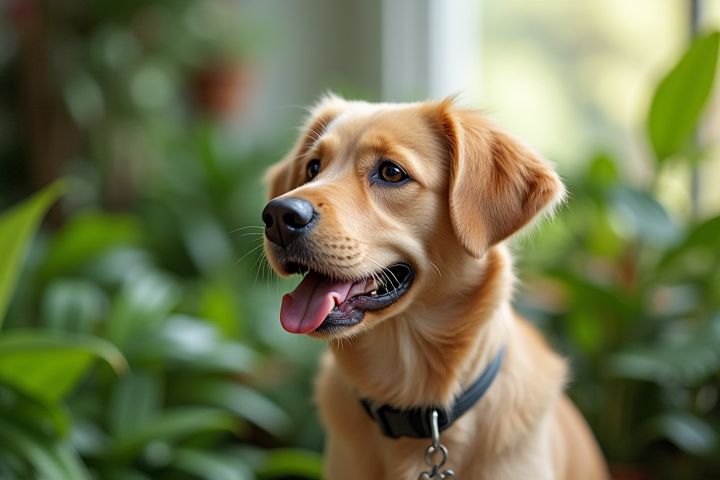
Several houseplants are safe for pets, making them ideal additions to your home. The Spider Plant (Chlorophytum comosum) is non-toxic to cats and dogs and thrives in low-light conditions. The Boston Fern (Nephrolepis exaltata) not only purifies the air but is also safe for your furry companions. The Parlor Palm (Chamaedorea elegans) adds a tropical touch while remaining pet-friendly. If you're looking for a colorful option, consider the African Violet (Saintpaulia), which offers beautiful blooms without posing any danger to your pets.
What Houseplants Are Safe For Pets
Spider Plant
Spider Plants (Chlorophytum comosum) are an excellent choice for pet owners, as they are non-toxic to cats and dogs. This hardy houseplant can thrive in various light conditions, preferring bright, indirect sunlight, with temperatures ranging from 65 to 75 degrees Fahrenheit. You can expect your Spider Plant to grow up to 24 inches tall, producing arching leaves that can add aesthetic appeal to any room. By incorporating Spider Plants into your home, you can enjoy a lush green environment while ensuring the safety of your furry companions.
Boston Fern
Boston Fern (Nephrolepis exaltata) is a popular houseplant renowned for its lush, feathery fronds and air-purifying qualities. This non-toxic plant is safe for pets, making it an ideal choice for homes with cats and dogs. The Boston Fern thrives in humid environments and requires indirect sunlight and consistent moisture to flourish. Your furry friends can safely enjoy the greenery without the risk of harmful ingestion, while you benefit from improved indoor air quality.
Areca Palm
Areca Palm (Dypsis lutescens) is a popular houseplant known for its graceful, feathery fronds and air-purifying qualities, making it safe for your pets. This vibrant palm thrives in bright, indirect light and requires moderate watering, allowing the top inch of soil to dry between waterings. Aside from its aesthetic appeal, Areca Palm contributes to a healthier indoor environment by removing toxins such as formaldehyde and xylene from the air. Providing shade and humidity, this non-toxic plant is an excellent choice for households with curious pets.
Bamboo Palm
Bamboo Palm (Chamaedorea seifrizii) is a popular houseplant known for its air-purifying qualities and pet-safe nature. This attractive palm can grow up to 4 feet tall and thrives in indirect sunlight, making it an excellent choice for indoor spaces. With its ability to remove toxins like formaldehyde and benzene from the air, the Bamboo Palm not only enhances your home decor but also contributes to a healthier environment for both you and your furry companions. Keeping the humidity levels between 50-70% will help this plant flourish, ensuring it remains vibrant and lush.
Peperomia
Peperomia is a pet-safe houseplant, making it an excellent choice for homes with furry friends. This resilient plant features thick, glossy leaves that come in various colors and patterns, adding a vibrant touch to any space. Its low maintenance requirements allow you to easily care for it, thriving in indirect sunlight with occasional watering. By incorporating Peperomia into your indoor garden, you create a visually appealing environment without compromising your pets' safety.
Calathea
Calathea species, often referred to as prayer plants, are non-toxic to pets, making them an excellent choice for households with cats and dogs. With over 200 varieties, these plants are cherished for their striking leaf patterns and unique ability to fold leaves at night. Calatheas thrive in indirect light and require humidity levels above 50%, which can be easily achieved through regular misting or a nearby humidifier. Remember to keep the soil consistently moist but not soggy, as this tropical plant prefers a well-draining potting mix.
Gloxinia
Gloxinia, also known as Sinningia speciosa, is a beautiful houseplant native to South America and is non-toxic to pets, making it an excellent choice for pet owners. With its vibrant blooms and lush green leaves, Gloxinia can thrive indoors with proper care, requiring indirect sunlight and moderate humidity. It's essential to keep the soil consistently moist but not waterlogged, as this plant prefers well-draining conditions. By choosing Gloxinia, you can enhance your home decor while ensuring a safe environment for your furry friends.
African Violet
African Violets (Saintpaulia) are not only popular for their vibrant blooms but are also safe for pets, making them an excellent choice for households with furry companions. These charming houseplants thrive in moderate, indirect sunlight and require well-draining soil, ensuring they remain lush without posing a risk to your pets. Their maintenance involves regular watering to keep the soil slightly moist but never soggy, which helps prevent root rot. With their pet-friendly nature and beautiful flowers, African Violets add a splash of color to your home while keeping your four-legged friends safe.
Friendship Plant
The Friendship Plant, scientifically known as Pilea involucrata, is a pet-safe houseplant that thrives in indirect sunlight and humid environments. This compact perennial can reach a height of 12 inches, featuring round leaves with a distinct quilted texture and striking green and bronze coloration. When caring for your Friendship Plant, maintain a consistent watering schedule, allowing the top inch of soil to dry out between waterings to prevent root rot. Enriching your home with this non-toxic plant not only complements your decor but also ensures a safe environment for cats and dogs.
Parlor Palm
The Parlor Palm (Chamaedorea elegans) is a popular houseplant known for its pet-friendly nature, making it a great choice for households with cats and dogs. This slow-growing palm can reach heights of 4 to 6 feet and thrives in low light conditions, making it adaptable to various indoor environments. With its feathery, arching fronds, the Parlor Palm not only adds aesthetic appeal but also improves indoor air quality by filtering out toxins. Caring for this plant involves keeping the soil slightly moist and avoiding direct sunlight, ensuring a healthy and safe green space for you and your furry companions.
